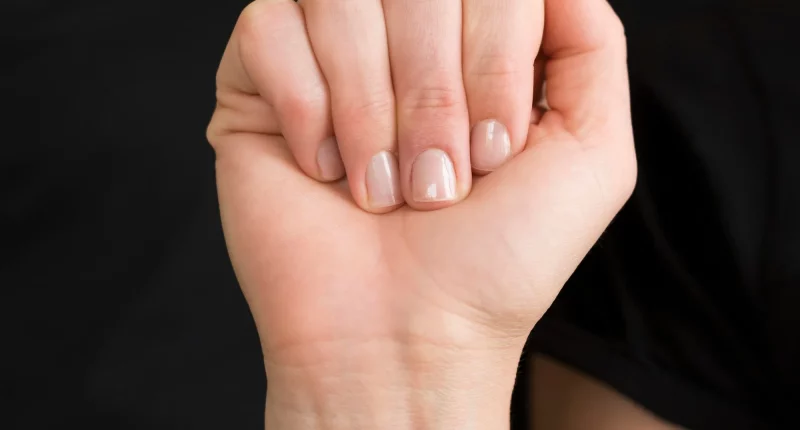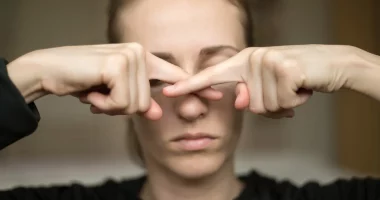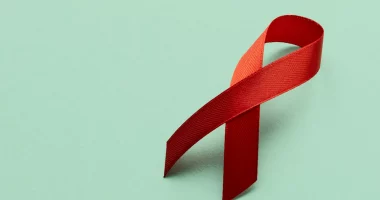Brittle nails, medically termed onychoschizia, are a common issue affecting many people. This condition causes nails to become thin, soft, or easily split. It’s often linked to moisture problems or underlying health issues.
The American Osteopathic College of Dermatology notes that brittle nails are more prevalent among females than males. This difference may be due to hormonal factors or differences in how nails are cared for.
Luckily, there are effective ways to strengthen brittle nails and stop future problems. By taking good care of your nails, such as using moisturizers to keep them hydrated and avoiding harsh chemicals, you can enhance their strength and resilience. Regularly trimming and protecting nails during tasks like dishwashing can also help maintain their health.
Overall, with proper care and attention, it’s possible to significantly improve the condition of brittle nails and promote better nail health in the long run.
Causes of Brittle Nails
Brittle nails can be caused by extreme or mild moisture, often because of external factors. The American Osteopathic College of Dermatology classifies two main types of brittle nails based on moisture problems: soft and brittle and hard and brittle.
Mild Moisture
When nails are brittle and hard, it means they don’t have enough moisture. Activities like frequent hand washing or dishwashing can strip nails of moisture. Dry environments or winter weather can also lead to dry nails
Extreme Moisture
Brittle and soft nails occur when there’s too much moisture. This can take place if someone uses excessive hand moisturizer or harsh chemicals like acetone nail polish remover.
Other Causes
Several conditions and factors can also contribute to this condition:
- Anemia: A lack of enough hemoglobin, which carries oxygen in the blood, can cause extreme tiredness and brittle nails
- Thyroid Disorders: Imbalances in thyroid hormones can affect how minerals are absorbed in the body, leading to nail problems.
- Age: As people get older, nails naturally become weaker, making them more prone to breakage.
AOCD states that, if only fingernails are brittle while toenails are good, an external factor or specific condition might be to blame for the problem.
Home Remedies and Treatments for Brittle Nails
Treatment options for brittle nails are somewhat limited, with healthcare providers often suggesting supplements to enhance nail strength. Home care, however, offers several effective strategies to improve nail health.
One approach is to use nail hardeners, which can be applied as a clear coat of polish or other specialized products. This can gradually increase the strength of soft nails over time.
Moisturizing is crucial for those with dry nails. Regularly applying moisturizer to the nails and hands, either throughout the day or before bedtime, can significantly reduce nail brittleness by boosting moisture levels.
Another helpful practice is putting on gloves during activities such as washing dishes or utilizing cleaning agents. This simple step protects nails from excessive exposure to chemicals and water, helping to stop further damage and promote nail strength.
Diet and Nutrition for Stronger Nails
Making dietary changes can significantly improve brittle nails. Here are some effective strategies:
Taking Supplement
According to the AOCD, biotin supplements can strengthen nails, though it may take up to six months to see results. Approximately one-third of cases benefit from biotin. Other supplements like colloidal minerals, calcium, and gelatin can also be beneficial.
Getting Adequate Protein
Nails are primarily composed of keratin protein. Ensuring sufficient protein intake is crucial for enhancing keratin production and increasing nail strength.
Consuming Iron-Rich Foods
For individuals with anemia or iron deficiency, consuming iron-rich foods like spinach or red meat is essential. Iron supplements may also be considered, but consulting a healthcare provider beforehand is advisable due to potential interactions with certain treatments.
Tips for Maintaining Healthy Nails
Taking proper care of nails becomes increasingly important with age to reduce brittleness and ensure overall nail health. Here are some helpful tips:
- Regularly file nails gently to smooth out rough spots and snags, which can help reduce breaks.
- Avoid utilizing metal instruments or tools on nails, as they can cause damage.
- Steer clear of nail polish removers containing acetone, which can dry out nails.
- Protect nails by putting on rubber gloves when engaging in activities like washing dishes or other tasks involving water.
- Keep nails trimmed to a manageable length for strength and to prevent snagging.
- Avoid habits like picking at or biting nails, which can weaken them and lead to damage.
By following these practices, individuals can promote strong, healthy nails throughout their lives.
When to Consult a Healthcare provider
Brittle nails usually aren’t a big worry, but it’s wise to see a healthcare provider if other symptoms show up.
For instance, feeling tired might mean you’re low on iron or have anemia. Changes in weight could point to a thyroid problem.
If home remedies don’t toughen up your nails, it might be time to see a healthcare provider. They can recommend more treatments or figure out why your nails are brittle.
Summary
Brittle nails, known as onychoschizia, are common and affect both men and women, often due to moisture issues or underlying health conditions like anemia or thyroid disorders. Home remedies include using nail hardeners, moisturizing, and wearing gloves during chores.
Dietary changes such as taking biotin supplements and eating iron-rich foods can strengthen nails. Regular care like gentle filing and avoiding harsh chemicals helps prevent breaks. If brittle nails persist despite home care, seeing a doctor is advisable to check for underlying health issues or recommend additional treatments.








